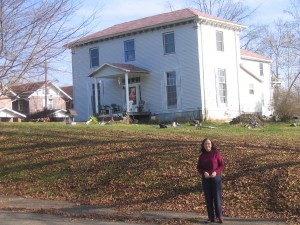

The following article was originally submitted by Linda Donegan to the Charleston, WV Civil War Roundtable:
Henrietta Fitzhugh Barr
In 1835, Henry Fitzhugh and his wife Henrietta settled in Ravenswood. They had acquired land and built a home on the corner of Walnut and Race Streets. They had come to Ravenswood from Fauquier County Virginia and being of aristocratic stock brought their black servants (slaves) with them. (At this time there were only fifty-five slaves in Jackson County.) It is believed that the Ravenswood property, owned and surveyed by George Washington, was inherited by Henrietta who was a grandniece of his. The Fitzhugh family established a saw mill and a grist mill which more than adequately provided for the needs of the family.
Henry and Henrietta had a daughter whom they also named, Henrietta. Henrietta married David Barr; thus we have Mrs. Henrietta Fitzhugh Barr. The Barrs built a home on the corner of Mulberry and Race Streets and had a daughter named Molly.
Mrs. Barr lost her husband prior to the start of the American Civil War. Her daughter Molly died of diphtheria on December 5, 1860. During the war, her mother and her sister, Ann, lived with Henrietta. Henry Fitzhugh, her father, had died by this time.
Some of the other prominent families of Ravenswood were from the Virginia aristocratic/slave owning class. The Flemings and the Parks are often mentioned in Henrietta’s diary. These families often visited one another for “teaâ€. Other social contacts were made in the local Episcopal church of which these families were members. Henrietta’s diary mentions attending Sunday school and states that there was “no preaching.†Her sister, Ann, was the Sunday school superintendent. In Ann’s absence, Henrietta filled the position of superintendent. It is uncertain as to the reason for “no preachingâ€. Perhaps a minister simply wasn’t available.
Henrietta Fitzhugh Barr had a turn of character that made her appear less then congenial to her neighbors. She was an aristocrat and tended to place herself above others. She was easily offended and often referred to her neighbors as “Union Black Republicans.†Any “ill†that came her way she blamed on these Republicans.
During the Civil War, the Union Army took control of the family saw and grist mills to support army needs. This was a substantial financial loss for Henrietta and even more reason to despise her “Union supporting†neighbors. She did maintain a garden and raised pigs and chickens; however, these too were required to supply Union troops in the Ravenswood area. She was not without sustenance but she did resent feeding northern troops. Items such as flour, salt and sugar were in short supply and had to be acquired from Wheeling. When her order would arrive at the Ravenswood wharf, the wharf master would not release her goods to her. He insisted that she first take the oath of allegiance and then pay the eighty cent fee due him. She refused to do both and her goods were returned to Wheeling. Food was scarce to “Southern Sympathizers†and her Northern neighbors had no pity on such a one as Henrietta Fitzhugh Barr.
-2-
Henrietta always described Union troops as being “rude and ruthlessâ€. They were always begging for food; breakfast, lunch and dinner. She had a particular dislike for Union Cavalry Commander Dan Frost. On the other hand, she noted that the Confederate troops, under Jenkins’ command, were “polite and mannerlyâ€.
Henrietta preferred the summer months when the river was low because the Union gunboats could not maneuver and the Confederate troops were more prominent in the area; even then she complained about the “dustâ€. During the winter months and the return of the rains, the Union gunboats were back in action and the Confederate troops would retreat. Henrietta then complained about the troops and the “knee deep mudâ€.
The diary of Henrietta Fitzhugh Barr begins at the time of Fort Donelson; February 1862. Four of her five brothers were in the military during the war. Her brothers Theodore and George were at Fort Donelson but were unable to enter combat due to sickness. Nick and Henry were stationed in the Virginia theater of action. Her brother, Burdick (?), had died before the war or during the war’s early months (1862?). Her diary ends abruptly in August of 1863. We know that at that time all of her brothers in the military were still alive. We know that Theodore survived the war because he returned to Ravenswood and built a home there.
Henrietta does make mention of her slaves in her diary. She speaks of Rosella and Virginia by name. She reported the escape of many slaves crossing the Ohio River on the “Loganâ€. We aren’t certain if the Logan was a boat or a train or some other means of transport. But by boarding the Logan the slaves were “bidding adieu to Dixieâ€. By 1863 all slaves were gone from the area; they remained listed on the census but they were gone.
The war years weren’t all gloom for Henrietta. She recorded trips to Louisville with her sister Ann. They would stop in Cincinnati, Ohio, to shop. It was during one of her trips that she reported of an opportunity to gall her Northern neighbors. She was traveling aboard a sternwheeler. In the dining area, she overheard a conversation regarding Mr. Lincoln’s request for the nation to fast in order to better provide for the Union Army. In defiance, she ate heartily and urged her companions to do the same. She may not have dared to speak aloud her disdain for the North but she could speak ever so noticeably by her actions.
Henrietta believed that the news was biased toward the Union. Her preferred information source was the Cincinnati Inquirer. (Cincinnati: The most disloyal city in the Union). Accurate information was difficult to obtain. No telegraph existed in Ravenswood. Much of the news was passed on by word of mouth. People were often left to fit together the bits of information received as best they could and draw their own conclusions. Needless to say, the conclusions
-3-
drawn were not always precise. In fact, Henrietta’s diary, which ended in 1863, indicated that she believed that Lee had won the day at Gettysburg. It wasn’t until
the Confederate loss at Vicksburg that she realized that “defeat†was the fate of her beloved South.
As stated, Henrietta’s diary comes to an abrupt end in August 1863. At that time, she moved to Charleston to live with her sister, Sara Cotton. Since Charleston has been mentioned, let’s note that Charleston was evacuated in 1862 due to Confederate invasion. In her diary, Henrietta reports seeing a “wagon train six miles long†heading to Ohio from Charleston. It was two days journey from Charleston to Ravenswood at that time. It appears that the normal route would be from Charleston to Ripley. You would rest overnight in Ripley and then complete your journey to Ravenswood and cross the river into Ohio.
Our diarist lived to the age of sixty-nine. You can still see the home of her parents in Ravenswood today. The Barr home was destroyed by fire in 1920. The home of her brother, Theodore, also remains in Ravenswood.
This information was presented at a meeting of the Civil War Roundtable of Charleston, West Virginia, which meets every third Tuesday of the month (September – May) at the South Charleston Library. Meeting hours are from
7:00 PM to 8:30 PM. The review of the Henrietta Fitzhugh Barr Diary was presented by a member of the roundtable–Monty. Thank you sir for a very enjoyable evening.
Respectfully submitted by: Linda Donegan






Leave a Reply